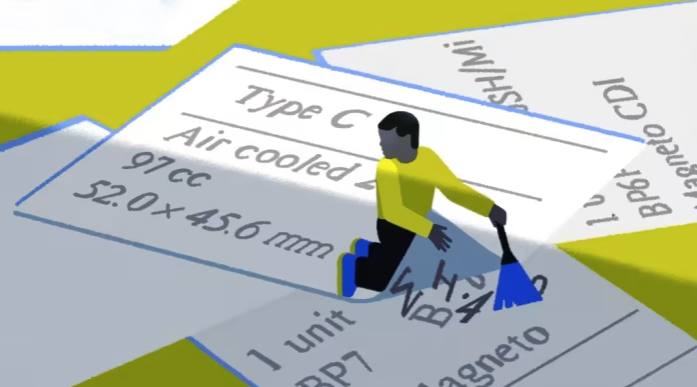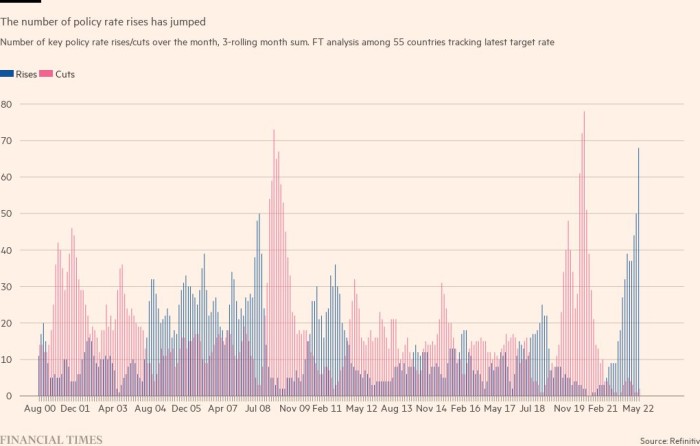Good morning. This article is an on-site version of our FirstFT newsletter. Sign up to our Asia, Europe/Africa or Americas edition to get it sent straight to your inbox every weekday morning
Central banks are raising rates rapidly in the most widespread tightening of monetary policy for more than two decades, according to a Financial Times analysis that lays bare the reversal of their previous historically loose stance.
Policymakers around the world have announced more than 60 increases in current key interest rates in the past three months, according to an FT analysis of central banking data — the largest number since at least the start of 2000.
The figures illustrate the sudden and geographically widespread reversal of the very accommodative monetary policies adopted since the global financial crisis in 2008 and boosted further during the coronavirus pandemic. Interest rates hovered near unprecedented lows in most advanced economies for the past decade, and in some cases went negative.
The sudden shift in policy comes as inflation has reached multi-decade highs in many countries, fuelled by soaring energy and food costs since Russia invaded Ukraine in February.
Jennifer McKeown, head of global economics service at Capital Economics, a research firm, said: “The world’s central banks have embarked on the most co-ordinated tightening cycle in decades.” Of 20 major central banks around the world, 16 are likely to raise interest rates over the next six months, says McKeown. Tightening is expected to be fastest in the US and UK.
Happy Monday. Thanks for reading FirstFT Asia. Here’s the rest of today’s news. — Sophia
Five more stories in the news
1. China fails to work out a plan to ease its economic malaise After the country’s zero-Covid policy brought its commercial activity to a halt, premier Li Keqiang has urgently warned that China needs to boost growth, reduce unemployment, and stabilise agricultural production. But local officials have little faith that the government is willing or able to help. Meanwhile, industrials profits continue to fall.
2. Ukraine forces hold out against Russian assault on key Donbas city Serhiy Haidai, governor of the Luhansk region that makes up half of the Donbas, said yesterday that Ukraine had driven Russian troops back from a highway, allowing Kyiv’s forces to supply the key city of Sievierodonetsk. Sievierodonetsk is the last big city in Luhansk still under Ukrainian control
3. Qatar urges the west to engage with the Taliban Qatari foreign minister Sheikh Mohammed bin Abdulrahman al-Thani has warned that a failure to step up engagement with the Taliban would risk Afghanistan falling into deeper chaos, a rise in extremism, and further economic crisis, which has already begun since the US pulled out of the country nine months ago.
4. South Korean IPO pipeline dries up on worries about global growth Initial public offerings in South Korea have slowed to a trickle after a record year in 2021. At least 10 Korean companies called off listings this year, citing difficulties in obtaining the valuations they wanted. Concerns about high inflation, slowing global growth and the war in Ukraine have caused investor sentiment to cool off.
5. UN envoy ‘unable to assess’ scale of Xinjiang repression Undermining her landmark investigation of China’s crimes against Uyghur Muslims, UN human rights chief Michelle Bachelet said she had been “unable to assess the full scale” of the notorious system of mass internments, forced labour and re-education camps in Xinjiang. US secretary of state Antony Blinken criticised Beijing’s efforts to restrict her visit.

The day ahead
WHO meeting The executive board of the World Health Organization holds its 151st session today in Geneva.
Economic outlook The OECD releases its economic analysis and projects for member countries and other major economies today.
Memorial Day The US observes Memorial Day today to commemorate military service members who have died. Financial markets are closed, and President Biden will attend an observance at Arlington National Cemetery.
African writing The AKO Caine Prize for African Writing shortlist is announced today.
What else we’re reading
Why EY’s break-up could radically reshape the Big Four After years of criticism over perceived conflicts of interest between its audit and advisory businesses, EY is weighing the separation of the two. Other professional service firms will reconsider their own structures — and might swoop for EY partners in the carve-up.
What is America’s end-game for the war in Ukraine? The Biden administration is now trying to conduct a delicate balancing act between supporting both Ukraine and America’s allies who worry about a long conflict. And while the US has said it will continue supporting the Ukrainian war effort, there’s less clarity about what a strategic defeat for Russia would actually look like.
Japan’s horrifying crop of data falsification is also encouraging Toyota, Japan Steel Works, and Mitsubishi Electric are among those that have recently acknowledged years of data falsification. As the search for some cultural explanation intensifies, one commonality between the scandals is that the whistleblowers have been given voice by companies’ ESG commitments.

Business flights are in trouble in the world of net zero From factoring flights into company bonuses to incorporating nudge theory in internal travel booking systems, companies have started to launch ever more inventive ways to cut back on air travel.
Bull market rhymes lead to a turn in the investing cycle Bitcoin and FAAMGs (Facebook, Apple, Amazon, Microsoft and Google) are the latest example of a bull market — something new that history can’t be used to discount. Stock market boom and busts occur and recur, abetted by the willing suspension of disbelief, writes co-founder and co-chair of Oaktree Capital Management Howard Marks.
Fashion
One way to get a summer print fix without going full frock is to style a pair of patterned trousers. Statement slacks capture fashion’s new maximal mood and offer a bohemian alternative to the summer dress. Plus, they are a breezy, comfortable option that still looks put together.

Thank you for reading and remember you can add FirstFT to myFT. You can also elect to receive a FirstFT push notification every morning on the app. Send your recommendations and feedback to firstft@ft.com. Sign up here.



